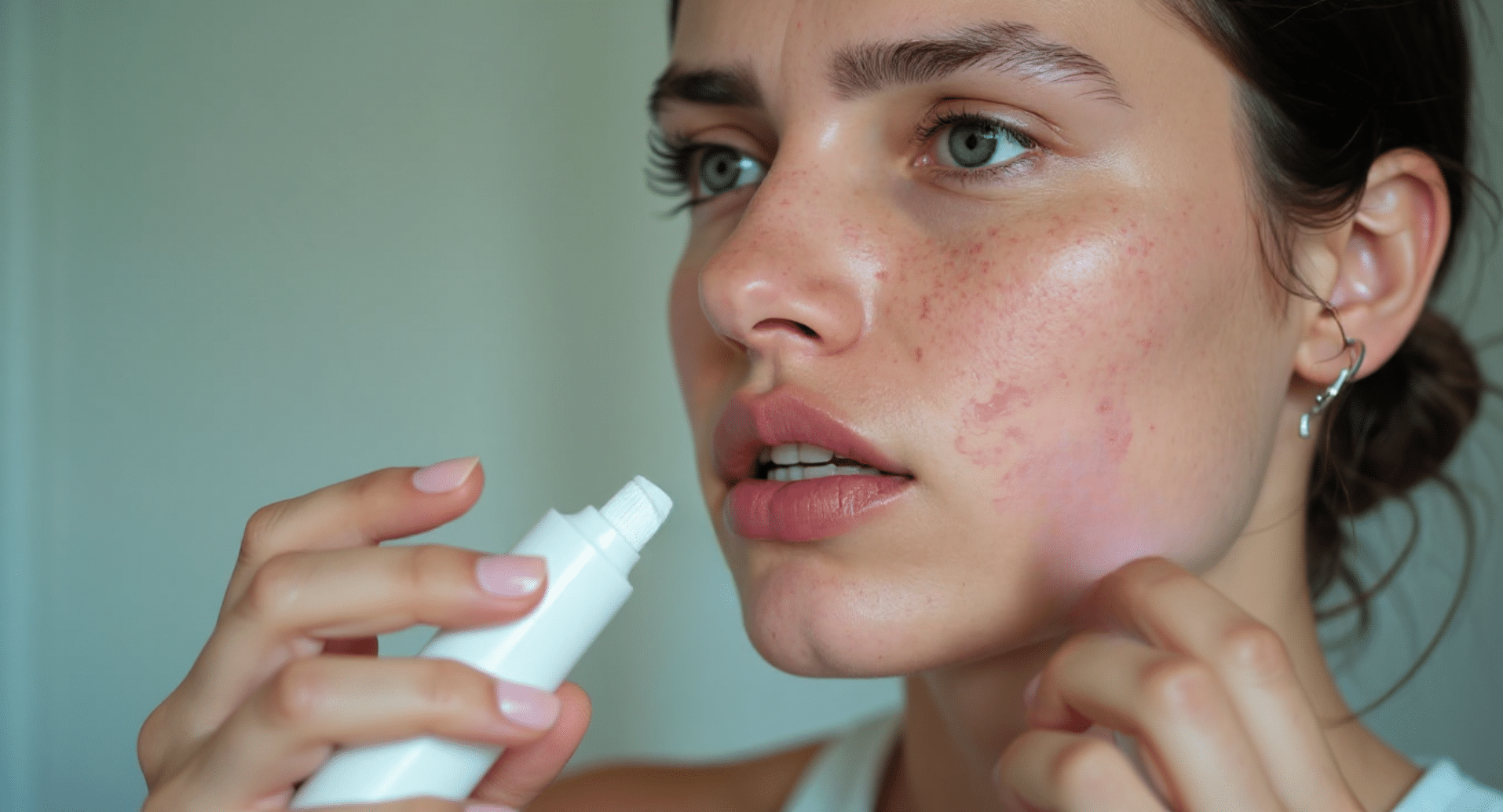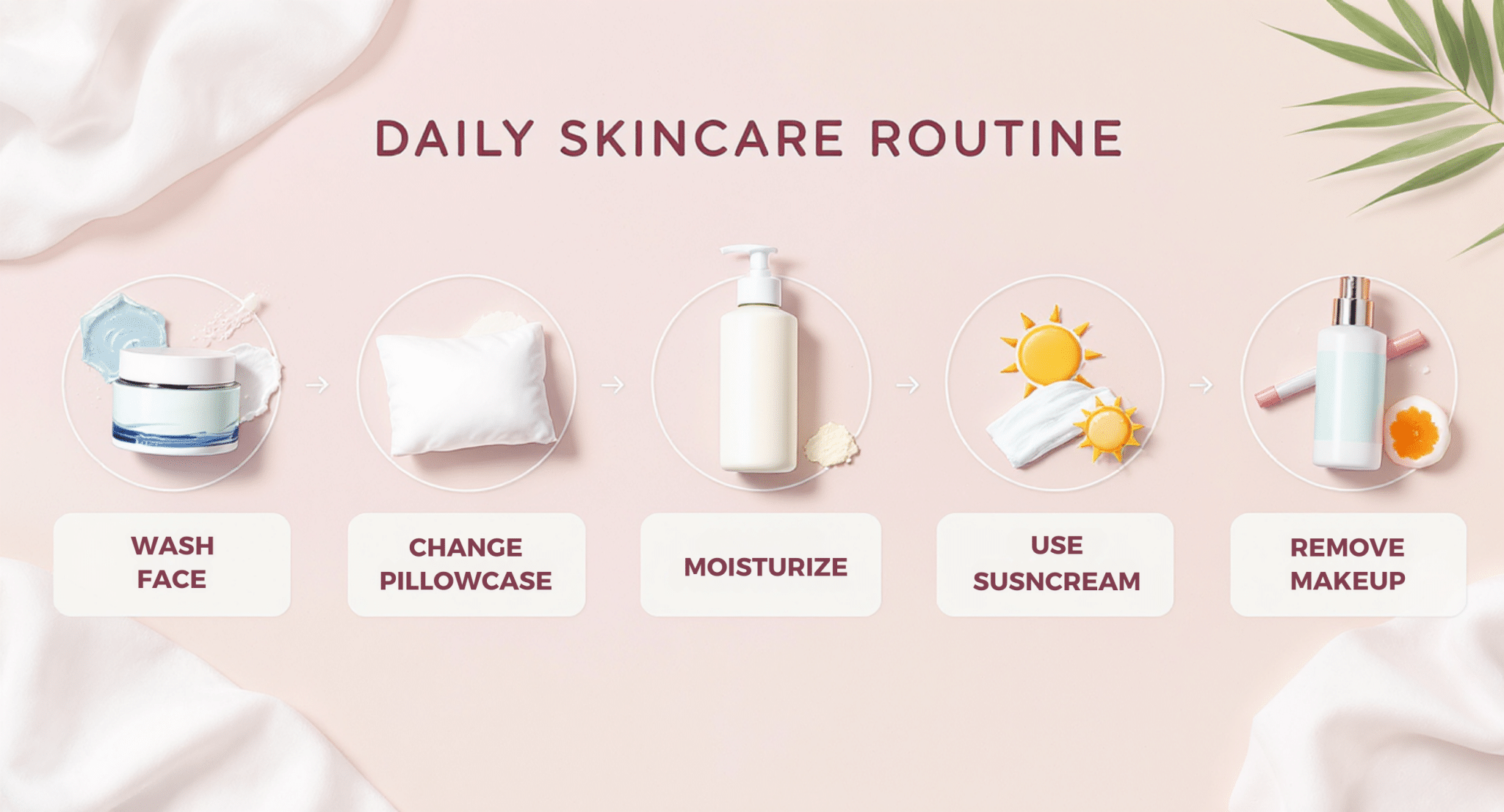Not every trending skincare hack deserves a spot on the bathroom shelf; some belong firmly in the “don’t try this at home” category.
When it comes to acne remedies, the internet is full of quick fixes. Ice cubes, lemon juice, and even toothpaste.
But here’s the burning question people keep asking: Does toothpaste help with pimples, or does it just make things worse?
By the end, you will know if this household staple is a secret weapon for breakouts or just another skincare myth ready to be retired.
Why People Think Toothpaste Helps Pimples
The idea that toothpaste can treat pimples has been around for decades. Your mom might have told you about it, or maybe you saw it in an old magazine. But where did this belief come from?
This idea stems from ingredients that appear to have acne-fighting properties. Many people believe it works because toothpaste contains ingredients such as triclosan and menthol.
When people ask if toothpaste helps with acne, they’re often thinking about how it dries out their mouth bacteria.
The logic makes sense at first. If toothpaste kills germs in your mouth, why wouldn’t it work on your face?
Plus, some people notice their pimples dry up after using it.
This quick result makes them believe they’ve found a miracle cure that’s already sitting in their bathroom.
Does Toothpaste Help With Pimples? The Risks You Need to Know

While toothpaste might seem like a quick fix, it is more complicated than you think.
Using toothpaste on a pimple can actually cause more harm than good. Let’s break down what really happens when you try this popular home remedy.
1. It Can Burn Your Skin
Toothpaste contains harsh chemicals that weren’t designed for your face. These ingredients can cause serious skin damage if left on overnight.
The main culprits include:
- Sodium lauryl sulfate – strips natural oils
- Fluoride – can trigger allergic reactions
- Menthol – causes burning sensations
- Whitening agents – bleach and irritate the skin
2. It Dries Out Your Skin Too Much
Your skin needs some natural oils to stay healthy. Toothpaste removes all moisture from the area, which sounds good in theory, but creates new problems.
Over-drying leads to:
- Increased oil production as your skin tries to compensate
- More breakouts in the surrounding area
- Painful cracking and irritation
3. It Can Leave Dark Spots
The chemicals in toothpaste can cause post-inflammatory hyperpigmentation. This means dark spots that persist long after the pimple has gone.
These dark marks happen because:
- Harsh ingredients damage skin cells
- Inflammation triggers excess melanin production
- Damaged skin takes months to heal properly
- Some people are more prone to scarring than others
4. It Can Cause Allergic Reactions
Many people don’t realize they’re sensitive to toothpaste ingredients until they put it on their face. The skin on your face is much thinner and more sensitive than inside your mouth.
Common allergic reactions include:
- Red, swollen bumps around the treatment area
- Itchy, burning sensations that won’t go away
- Blistering or peeling skin
- Spreading rash beyond the original pimple
5. It Disrupts Your Skin’s Natural pH Balance
Toothpaste is highly alkaline, with a pH of around 9-10, while healthy skin needs to remain slightly acidic, with a pH of 4.5-5.5. This huge difference throws your skin’s protective barrier completely out of whack.
When your skin’s pH gets disrupted:
- Harmful bacteria can multiply more easily
- Healing processes slow down significantly
- You become more prone to infections and breakouts
Safer and More Effective Alternatives
Instead of asking the question Does toothpaste help with pimples and risk skin damage, there are proven treatments that actually work. These alternatives are gentler on your skin while being more effective at treating pimples.
Here are better solutions that dermatologists actually recommend:
| Treatment | How It Works | Best For | Time to See Results |
|---|---|---|---|
| Salicylic Acid | Unclogs pores and reduces inflammation | Blackheads and whiteheads | 2-4 weeks |
| Benzoyl Peroxide | Kills acne bacteria and dries excess oil | Inflamed pimples | 1-2 weeks |
| Tea Tree Oil | Natural antibacterial with anti-inflammatory properties | Sensitive skin types | 2-3 weeks |
| Ice Cube | Reduces swelling and numbs pain | Fresh, inflamed pimples | 10-15 minutes |
| Hydrocolloid Patches | Draws out pus and protects from bacteria | Active breakouts | 8-12 hours |
Daily Rituals for Clear, Healthy Skin

Rather than asking Does toothpaste help with pimples, focus on building a consistent skincare routine.
Good daily habits can prevent breakouts before they start and keep your skin healthy in the long term.
- Wash your face twice daily with a gentle, non-comedogenic cleanser to remove dirt and excess oil
- Use lukewarm water instead of hot water to avoid stripping your skin’s natural moisture barrier
- Apply a lightweight, oil-free moisturizer even if you have oily skin to maintain proper hydration
- Never skip sunscreen during the day, as UV damage can worsen acne and cause dark spots
- Change your pillowcase twice weekly to reduce bacteria transfer while you sleep
- Avoid touching your face throughout the day to prevent spreading germs and oils
- Remove makeup completely before bed using a gentle makeup remover or micellar water
Signs It’s Time to Call a Skin Expert
While many pimples can be handled at home, some situations require professional help.
A dermatologist can provide treatments that work faster and prevent permanent damage to your skin.
1. Your Acne is Getting Worse Despite Treatment: If you’ve tried over-the-counter products for 6-8 weeks without improvement, it’s time to see a professional. Persistent or worsening breakouts often need prescription medications.
2. You’re Developing Cystic Acne: Large, painful bumps under the skin that don’t come to a head need professional treatment. These deep infections can cause permanent scarring if not handled properly.
3. Acne is Affecting Your Daily Life: When breakouts impact your confidence, work, or social activities, professional help can make a real difference. Mental health matters just as much as physical health.
4. You’re Seeing Scarring or Dark Spots: Any signs of permanent damage require immediate professional attention to prevent further scarring and fade existing marks.
5. You Have Hormonal Acne: Breakouts that flare up with your menstrual cycle or appear along your jawline and chin often need hormonal treatments that only doctors can prescribe.
Patching It Up
The question – Does toothpaste help with pimples lingers as one of the most common skincare myths, but the truth is clear: it does more harm than good.
Toothpaste can burn, irritate, and leave lasting marks, making it an outdated trick best avoided.
Instead, trust proven options like salicylic acid, benzoyl peroxide, or tea tree oil, along with consistent daily habits that keep skin clear and healthy.
Ready for clearer skin? Start with science, not shortcuts.


